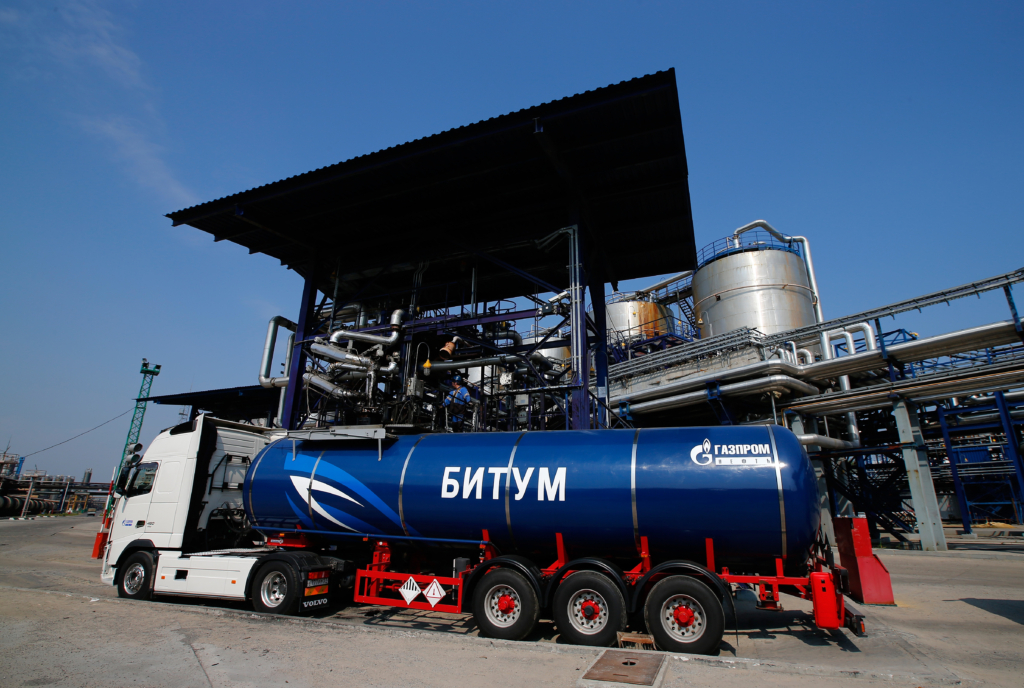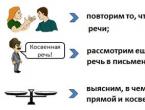LLC gaspromneft - bitumen materials
- Anatoly Moiseevich, OJSC Gazprom Neft is one of the largest suppliers of bitumen materials. How do you assess the state of their production in Russia, what is its peculiarity and what is the general outline of the development strategy of this business sector from the point of view of the company?
In my opinion, today the development of bitumen production in Russia is significantly affected by a number of specific factors. These are significantly increased requirements for the quality of bitumen, and the seasonality of bitumen production, and a small difference in the price of bitumen and raw materials for its production. The most important problem for us, as manufacturers, is the stabilization of the quality of raw materials.
Bitumen production of Gazprom Neft is now represented at three plants of the company - Omsk, Yaroslavl and Moscow. But year-round bitumen production is still carried out only at the Moscow refinery. At the same time, the total productivity of all bitumen blocks of the company is about 1.2 million tons per year.
The implementation of the company's bitumen has a wide geography. Thus, bitumen from the Moscow and Yaroslavl refineries is mainly supplied to the Central and North-Western regions, and bitumen from the Omsk refinery to the Urals, the Far East and Siberia. At the same time, the proportions of production of various grades of bitumen in the company are still unchanged, most of them are road bitumen, the demand for which is growing annually. In this regard, the company adopted a strategy for the development of the bitumen business and created an appropriate unit - the Office of Bitumen Materials. And the Gazprom Neft bitumen strategy itself was developed taking into account international experience and is linked to solving problems in the use of road bitumen in Russia.
- What is the essence of this strategy and what are its main stages?
Our company plans to implement a number of activities during three time phases. The first stage is aimed at solving long-term problems. First of all, it is the expansion of the range of produced bitumen with the obligatory production of European standard bitumen, modified bitumen, as well as promising binders - emulsions. The use of bitumen emulsions increases the season road works and improves quality pavement. In addition, at this stage, Gazprom Neft will expand its presence in traditional markets and enter new markets, as well as begin work to further promote the company's products.
The second stage is the stage of significant changes and capacity building of bitumen production. The expansion of bitumen production of Gazprom Neft is associated with the organization of bitumen production in the regions, as well as the shipment of bitumen by the company's own transport.
The third stage is the stage of achieving the goals, namely, the production of high-quality bitumen, as well as the integration of the bitumen business by geographical segments.
The goals of Gazprom Neft are ambitious, but real and achievable and reflect current and future trends in the bitumen business. Realization of the set goals will allow the company to increase its share in the Russian market, maximize its own bitumen capacity, create regional bitumen production and, finally, ensure the company's investment efficiency.
- When a company such as Gazprom Neft takes on business, the road builders have a feeling of optimism, but it is important that the program for the production of domestic high-quality bitumen, and the company probably has other strategic interests, does not appear on the list of priority projects.
Of course, our company has great potential and considers the development of bitumen business one of the priority areas of production and commercial activity. There are all the necessary prerequisites for this. This includes the wide geography of the company's manufacturing enterprises, and the presence of significant production reserves, and active interaction with government bodies, such as the Ministry of Transport, and consumers of products, primarily with enterprises of Rosavtodor and large contractors.
In addition, I would also note the company's high image in the CIS market as a producer of high-quality petroleum products and the orientation of Gazprom Neft towards long-term relationships with consumers.
- The successful implementation of the program for the development of the national road network and international transport corridors, which the President of Russia called a priority in the economy, largely depends on the quality of bitumen. What, in your opinion, is the role of Gazprom Neft and other leading Russian companies with interests in this business sector?
In recent years, the production and consumption of bitumen in Russia, primarily for road constructionincreases from year to year. This is directly related to the implementation of large-scale plans for the development of the national road network and the reconstruction of the International Transport Corridors. In conditions of economic recovery, the attitude of the state towards road facilities, there is a significant increase in industry financing. Moreover, the current relatively low density of roads and their quality impede the economic and social development of the regions. On the other hand, from a business point of view, this sector is promising. Increased funding for the construction of new roads, overhaul existing, the implementation of the multi-year Federal program “Modernization of the transport system of Russia” is a reliable guarantee of guaranteed consumption of road bitumen.
Given this perspective, Gazprom Neft is actively engaged in the development of its own bitumen business, with a customer focus and strict responsibility for the quality of its products. I am sure that all participants in the bitumen materials market see its attractiveness, which means that the competition will be even tougher, especially in matters of the quality of bitumen and the services provided. This is exactly what road builders expect, and in the end, everyone will benefit - both manufacturers and consumers, and you and I, road users.
With the current situation and forecast for the development of the Russian market oil bitumen can be found in the report of the Academy of Industrial Market StudiesThe development of the road network in Russia has always been and remains one of the most pressing issues. And the durability of the coating highways - an urgent task of the industry, which state regulators together with manufacturers of products for the road industry have been actively solving in recent years. The use of innovative technologies and materials will improve the quality indicators of roads, optimize the construction time and reach the turnaround time roadbed up to 12 years old.
Today, highways between major megacities and streets of big cities are experiencing the greatest load: 90% of federal roads have asphalt concrete pavement, the most important of which is bitumen. The longevity of the road depends on its quality. To increase the service life of the asphalt mixture is possible due to the use of road bitumenmodified by polymers.
Polymer additives improve adhesion, increase stability asphalt concrete pavement to temperature fluctuations and rutting, which on average extends the life of the road by more than a third. In world practice, modified bitumens have been successfully used for more than one decade, for example, their volume in European road construction reaches 15%, and Alaska - 50%.
For the Russian road industry, polymer-bitumen binders (PBB) are a relatively new product, it began to be used on an industrial scale about five years ago, however, annually showing significant growth dynamics - from 0.02% in 2014 to 3% in 2015 .
At the same time, PBB is a very specific material, for its high-quality production it is necessary to carefully observe the technology, use prepared raw materials and suitable equipment, and monitor physical properties. So, the use of bitumen is limited to a certain plasticity interval, which depends on the temperature range of the bitumen. The introduction of polymers in bitumen solves two problems at once: it increases the plasticity interval and gives the bitumen binder elasticity.
The most effective domestic modifiers today are SBS copolymers, styrene-butadiene thermoplastic elastomers. The quality of Russian-made products is not inferior to world analogues.
In addition to SBS copolymers, styrene-butadiene rubbers, polyolefins, ethylene-vinyl acetate, crumb rubber, etc. are used in the world. However, the long-term European practice of using modified bitumen has shown the unambiguous advantages of SBS-polymer due to its ability to improve high and low temperature properties of the binder, elasticity and adhesion. The use of polymers such as styrene-butadiene-styrene in Russia is fixed by GOST.
A special role in preserving the properties of PBB is played by the duration and temperature regime of heating, which often worsen the properties of the binder. This process requires strict control. The correct heating mode of the PBB ̶ without overheating, with stirring (circulation) is an important condition for obtaining high-quality asphalt mixes.
On the territory of Russia there are about 50 plants for the production of PBBs, and the quality of finished products varies greatly everywhere. By mixing bitumen with polymer and plasticizer, it is not always possible to obtain high-quality PBB. In order for this mixture to really improve the basic operational characteristics of the road, the polymer must “earn”. Manufacturers with sufficient experience who constantly conduct quality monitoring in Russia are no more than five or six.
So, for example, the largest site in Russia for the production of high-quality polymer-bitumen binders is the Ryazan plant of bituminous materials Gazprom Neft. The company produces more than 20 brands of high-tech modified bitumen that meet the requirements of not only Russian standards, but also the European Union (EN). The modernization of the Ryazan asset enabled the company to reach record production figures. The previous maximum for the year was at 32 thousand tons, and the result of 2015 was already 43 thousand tons. This was also possible thanks to active interaction with consumers and the release of bitumen materials according to individual recipes.
In addition, in order to improve the properties of PBB and asphalt concrete based on them, Gazprom Neft has been conducting laboratory tests for several years and building pilot plots with modified binders from St. Petersburg to Vladivostok. The results of monitoring the experimental sites confirm that the use of modern materials instead of traditional road bitumen can extend the life of the coating and reduce the cost of operating the road, reducing overall road life cycle costs. According to the monitoring data of such sections, after three years of service, the average track depth in the section using traditional bitumen reaches 7 mm, and in the section with modified bitumen, it does not exceed 4 ̶ 4.5 mm.
“We not only study international experience and introduce innovative technologies and best practices in our own production, but also actively advocate for the development of the modified bitumen segment in the Russian market. To this end, we are joining forces with all leading market players to develop common standards and norms for road construction, to create an industry-wide quality control system for polymer binders, ”said Dmitry Orlov, Director General of Gazpromneft - Bituminous Materials.
In recent years, in the Russian road industry, the issue of improving the regulatory framework on the use of economically feasible materials and technical solutions in the construction of roads is relevant. To adapt the existing standard to modern conditions, a new version of GOST for polymer-bitumen binders is being prepared. In the new document, the use of modified bitumen will be regulated taking into account the traffic intensity on the road, the load capacity of the routes and the climatic conditions of the regions. The possibilities of using various modifiers, their effect on the asphalt mix and the performance properties of asphalt concrete will also be taken into account, new test methods will be introduced.

The research of asphalt concrete mixtures using PBB, as well as the study of modified bitumen, will be undertaken by the Gazprom Neft Research Center, which will open this year. The work of such a research site will raise the technological expertise of road materials to a qualitatively new level, which will be another step not only in the study of polymer-bitumen binders, but also in the development of the entire PBB market in Russia.
PBB-based asphalt coatings are characterized by increased resistance to rutting, high transport loads, and crack resistance at low temperatures. That is why, due to its improved characteristics, PBB should be used in the construction of roads almost everywhere, especially it is necessary on roads with high traffic density and in severe climatic conditions. At the same time, financial costs are blocked by a significant increase in the overhaul time of the road surface and an increase in road safety.
PJSC Gazprom Neft (location: 190000, St. Petersburg, Galernaya St., 5, letter A), which is the copyright holder of the Work (hereinafter - the Licensor)
in accordance with Article 1286.1 of the Civil Code Russian Federation grants the right to use the Work to a person who wants to use this Work and who is ready to fully and unconditionally accept the terms of this open license (hereinafter - the Licensee).
- Subject of an open license: the right to use the Work, that is, a specific photographic or audiovisual work, posted on a website on the Internet:, to the extent established by this open license. A separate open license is provided for the use of each Work. Type of license: simple (non-exclusive) license. Duration of an open license: 1 year, counting from the date of granting an open license. The territory in which the use of the Work is allowed: the territory of the whole world. An open license is free of charge.
- An open license is a contract of accession. An open license is considered granted (an accession agreement is considered concluded) at the time of full and unconditional acceptance by the Licensee of the conditions of an open license (acceptance). The following actions of the Licensee will be considered as acceptance: pressing the “accept” button located under the text of this open license, as well as writing the Work to the computer's memory (saving, that is, downloading the file containing the Work).
- The Licensee is granted the right to use the Work solely by the methods expressly indicated in this open license, namely:
- reproduction of the Work, that is, the production of one or more copies of the Work in any material form, as well as the recording of the Work in computer memory;
- distribution of the Works by alienation of its copies free of charge;
- public display of the Work using technical means in a place open for free visits, or in a place where there is a significant number of persons not belonging to the usual family circle;
- inclusion of the Work in the composition of information and scientific articles, catalogs, encyclopedias and Internet sites. Use of the Work in other ways is prohibited. - The licensee does not have the right to assign, transfer to third parties the rights and / or obligations, as well as transfer as collateral the rights received under this open license. The Licensee is forbidden in any way to rework the Work, create composite works (except as expressly specified in this open license), include the Work in complex objects, create derivative works (processing, film adaptation, arrangement, dramatization, etc.), add to the Work changes and additions. A work may be used exclusively in the form in which it is posted on a website on the Internet:. Use of the Work in fragmented (individual parts) is prohibited. The Licensor does not grant the Licensee the right to use the Work to create a new result of intellectual activity (new intellectual property).
- The Licensee undertakes to indicate the name of the Licensor as the copyright holder with each use of the Work.
- Use of the Work in violation of the terms of this open license is recognized as illegal use of the intellectual property and entails civil, administrative and criminal liability.
- The Licensor has the right to unilaterally completely or partially refuse an open license if the Licensee grants third parties the right to use the Work.
Created another daughter - Gazpromneft - Bitumen Materials (GNBM) - which will combine all the functions of managing the company's bitumen business.
The task of GNSS is implementation of the Gazprom Neft bitumen materials business strategy, which provides for improving asset management efficiency, achieving leading positions in Russia in terms of applying the latest production technologies, as well as developing promising areas of activity in accordance with the main industry trends.
By 2025, Gazprom Neft plans to increase sales of materials to 2.4 million tons, which is 30% more than in 2013.
This implies an increase in presence in the markets of Russia, Central Asia and Southern Europe.
Gazprom Neft is increasing its capacity for the production of bitumen materials both in Russia and in the CIS.
In 2012, a large bitumen plant was modernized, which allowed the launch of a new pre-road national standard (PNST).
Already in 2016 a decision will be made on the further implementation of the standard “Public Roads. Viscous petroleum bitumen. Technical conditionsTherefore, the actions of Gazprom Neft look justified.
Market share sales of bitumen products in Russia atGazprom Neft is 26%.
In 2013, the company announced the purchase of a plant production capacity of 280 thousand tons / year, located in southern Kazakhstan near the city of Chimkent,and Russia's largest production of polymer-bitumen binders, located in Ryazan.
In 2013, Gazprom Neft with OM the conference “Bitumen and WSP: Actual Issues 2013”, held in St. Petersburg.
In 2014, together with the French concern Total of new generation binders under the G-Way Styrelf brand.
“Gazprom Neft was one of the first in the Russian Federation to develop bitumen production as an independent business segment. Bitumen from the residual product of oil refining has become a high-tech material that requires a specialized approach at all stages of production and sales, ”A. Dyukov said.
Recall that the European bitumen market has not developed over the past 4 years.
This is happening not only because of the deteriorating economic situation, but also because of the introduction of innovative methods for the production of asphalt mixes and the application of pavements.
Oil refineries that process Russian oil in Europe experience known problems with the supply of raw materials and often buy it at the price of light oil. This has led to higher bitumen prices.
For the curious, we’ll inform you that according to forecasts, the global demand for bitumen will amount to 105 million tons by 2015, 112 million tons by 2018, and -120 million tons by 2020. Growth centers are countries in the Asia-Pacific region, including China and India, and the countries of North America.




